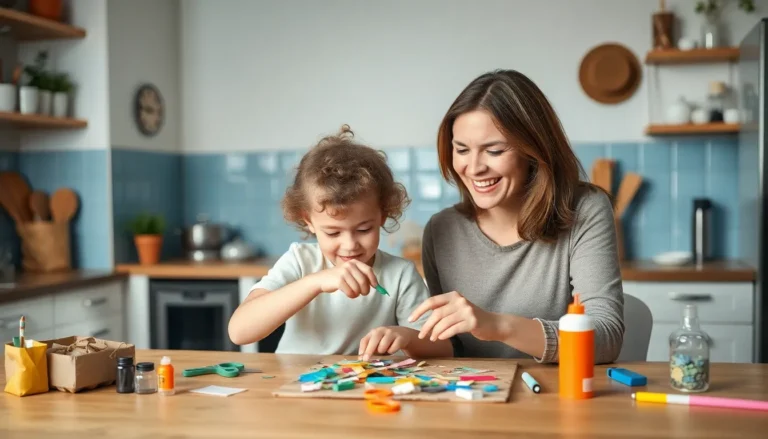Early childhood is a magical time when learning feels more like a treasure hunt than a chore. Play isn’t just a way to pass the time; it’s the secret sauce that fuels creativity and curiosity in young minds. With a sprinkle of fun and a dash of laughter, children discover the world around them, and that’s where the magic happens.
Table of Contents
ToggleImportance of Learning Through Play
Learning through play forms a crucial aspect of early childhood development. It allows children to engage in meaningful exploration and promotes essential skills through enjoyable experiences.
Benefits of Play in Early Childhood
Play fosters creativity and builds problem-solving skills. Engaging in different types of play enables children to express emotions and practice social interactions. Through playful activities, they develop fine motor skills and enhance cognitive abilities. Encouraging imaginative play leads to improved language acquisition and communication skills. Children gain a sense of independence and confidence while navigating through self-directed play.
Developmental Milestones Achieved Through Play
Play is essential for reaching developmental milestones. Social skills improve as children learn to share and cooperate with peers. Emotional regulation strengthens when children manage feelings during play scenarios. Physical coordination develops through active play, enabling better movement control. Cognitive growth occurs through structured games that enhance critical thinking. Language skills flourish as children engage in dialogue while playing, enriching vocabulary and comprehension.
Notable Quotes on Play-Based Learning
Play-based learning serves as a cornerstone for early childhood development, promoting joyfully engaging experiences. Numerous experts and educators highlight its crucial role through impactful quotes.
Inspirational Quotes from Experts
“Play is the highest form of research,” noted Albert Einstein, emphasizing the importance of exploration in learning. Maria Montessori argued, “Play is the child’s work,” underscoring play’s significance in developing autonomy. According to psychologist Lev Vygotsky, “Creative play is a primary means of child development,” reinforcing the notion that play fosters essential cognitive skills. Each of these voices supports the idea that play enriches early learning.
Quotes from Educators and Practitioners
“Children learn as they play,” stated Dr. Sue Palmer, emphasizing that play nurtures discovery and understanding. Renowned educator Fred Rogers once remarked, “Play gives children a chance to practice what they are learning,” illustrating how play provides practical application of new knowledge. Educator Loris Malaguzzi remarked, “The 100 languages of children are birthed through play,” showing how play opens avenues for expression. These perspectives from professionals shine a light on the instrumental role of play in early education.
Implementing Play in Early Childhood Education
Incorporating play into early childhood education enhances learning experiences. Play-based activities engage children while fostering essential skills.
Strategies for Incorporating Play
Utilizing various strategies can enrich play in education. Integrating outdoor exploration encourages physical activity and sensory experiences. Employing storytelling enables children to express creativity, stimulating language development. Offering open-ended materials, like blocks and art supplies, allows for imaginative play and problem-solving. Creating themed play areas, such as a kitchen or a garden, promotes role-playing and social interactions. Facilitating group games strengthens teamwork and cooperation skills. These strategies create an environment where learning flourishes through joyful engagement.
Role of Caregivers and Educators
Caregivers and educators play pivotal roles in facilitating play. Observing children’s interests allows them to tailor activities effectively. Supporting exploratory play encourages children to take risks and think critically. Providing guidance while respecting children’s autonomy promotes independence and confidence. Collaborating with parents to extend play-based learning at home fosters a consistent approach. Sharing insights into child development creates a supportive community focused on the value of play. These efforts ensure children thrive during their critical early years.
Challenges in Play-Based Learning
Play-based learning faces various challenges that can hinder its implementation in early childhood education. Addressing these challenges is essential for maximizing the benefits of play.
Overcoming Misconceptions
Misunderstandings about play-based learning often arise. Some adults view play as unproductive, believing it distracts from academic skills. The reality is that play serves as a natural vehicle for learning. Educators and parents need to recognize that children gain important knowledge through playful activities. This acknowledgment helps shift perspectives, allowing for a more supportive environment for play-based learning.
Balancing Play and Structured Learning
Finding the right balance between play and structured learning poses another challenge. It’s crucial to integrate both elements effectively. Educators can structure activities to incorporate learning objectives while allowing for exploration through play. Children thrive when they engage in hands-on, meaningful experiences in a well-organized setting. Flexibility in lesson planning enables educators to adapt based on children’s needs, ensuring both play and structure coexist harmoniously.
Embracing the power of play in early childhood education lays the foundation for lifelong learning and growth. The insights shared by experts highlight that play isn’t just an enjoyable activity; it’s a fundamental part of cognitive and emotional development. By recognizing play’s significance, educators and parents can create enriching environments that nurture curiosity and creativity.
As children engage in playful exploration, they develop essential skills that prepare them for future challenges. Balancing structured learning with ample opportunities for play ensures that children can thrive in their formative years. Ultimately, fostering a love for learning through play sets the stage for a bright future filled with discovery and innovation.








